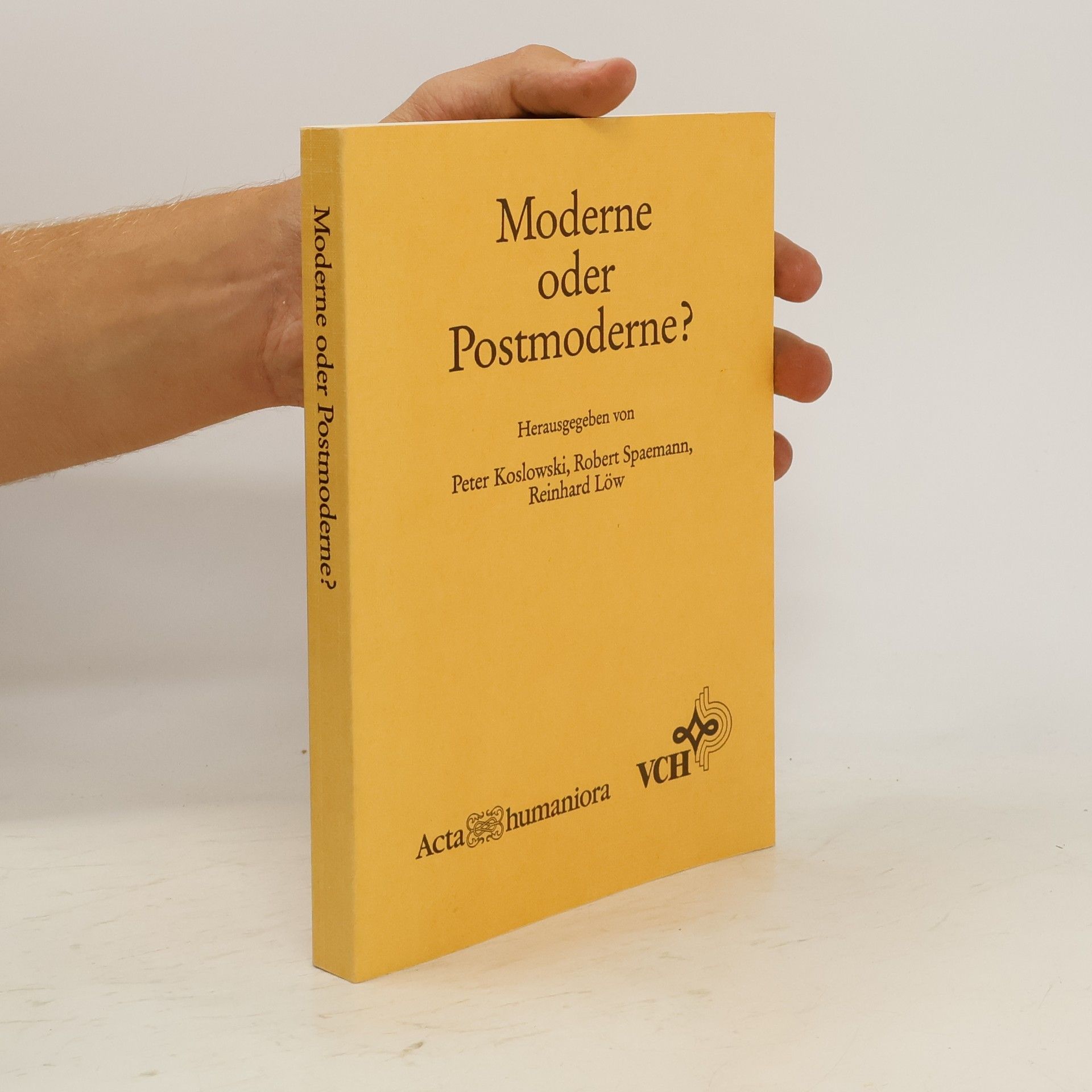Natürliche Ziele
Geschichte und Wiederentdeckung des teleologischen Denkens
Robert Spaemann was an influential German philosopher known for his profound explorations of ethics, anthropology, and political philosophy. His writings frequently delved into the fundamental questions of human existence, the nature of consciousness, and the moral underpinnings of society. Spaemann sought to bridge traditional philosophical thought with contemporary issues, offering readers a considered perspective on the complexities of the world. His clear and precise style earned recognition, and his work continues to inspire new examinations of philosophical concepts.







Geschichte und Wiederentdeckung des teleologischen Denkens
Medytacje na temat psalmów to osobiste przemyślenia świeckiego chrześcijanina i filozofa, który łączy wiarę w objawienie z rozumem. Autor nie rości sobie prawa do narzucania swoich refleksji innym, lecz uważa je za pomocne w modlitewnej recepcji psalmów. W tekstach zawarte są myśli wcześniejszych interpretatorów, tradycja chrześcijańskiego odczytywania psalmów oraz aktualny stan badań naukowych. W tym bogactwie analiz autor spotyka różne perspektywy, zarówno te, które się z nim zgadzają, jak i te, które myślą inaczej. W rzeczywistości pisał głównie dla siebie. Robert Spaemann (1927-2018) był filozofem i teologiem, który studiował na uniwersytetach w Niemczech, Szwajcarii i Paryżu. Pracował na uczelniach w Münsterze, Stuttgarcie, Heidelbergu i Monachium, a także był profesorem na wielu zagranicznych uczelniach, w tym w Liechtensteinie i Rio de Janeiro. Był profesorem honorowym Uniwersytetu w Salzburgu oraz doktorem honoris causa Katolickiego Uniwersytetu Lubelskiego. Jego główne obszary badań obejmowały filozofię polityki, etykę oraz historię myśli społecznej. W języku polskim ukazały się jego liczne dzieła, w tym eseje dotyczące etyki, teologii moralnej i antropologii.
Medytacje na temat psalmów to przemyślenia świeckiego chrześcijanina i filozofa, który łączy wiarę w objawienie z rozumem. Autor nie rości sobie prawa do narzucania swoich refleksji innym, lecz uznaje je za pomocne w modlitewnej recepcji psalmów. W swoich rozważaniach zawiera myśli wcześniejszych interpretatorów, chrześcijańską tradycję oraz aktualny stan badań naukowych. W bogactwie analiz, które prowadził dniem i nocą (Ps 1,2), odnajduje zarówno różne perspektywy, jak i te, które są mu bliskie. W rzeczywistości pisał przede wszystkim dla siebie. Robert Spaemann (1927-2018) był filozofem i teologiem, który studiował na uniwersytetach w Münsterze, Monachium, Fryburgu i Paryżu. Pracował naukowo w Münsterze, Stuttgarcie, Heidelbergu i Monachium, a także jako profesor na wielu zagranicznych uczelniach, w tym w Liechtensteinie i Rio de Janeiro. Był profesorem honorowym Uniwersytetu w Salzburgu oraz doktorem honoris causa Katolickiego Uniwersytetu Lubelskiego. Jego główne obszary badań obejmowały filozofię polityki, etykę i teologię moralną. W języku polskim opublikował wiele dzieł, w tym eseje dotyczące etyki, różnicy między osobami a rzeczami oraz myślenia teleologicznego.
Podtitul: Pokusy o rozlišení mezi "něčím" a "někým" Kniha Osoby představuje poslední, třetí díl pomyslné trilogie, spolu s první knihou Účelnost jako filosofický problém a druhou Štěstí a vůle k dobru; obě knihy již dříve vyšly v českém překladu. V první se Spaemann věnoval dějinám a obhajobě teleologického pohledu na přírodu a člověka, ve druhé pak zejména etice, s cílem překonat dichotomii mezi eudaimonismem a deontologismem. Ve třetí knize, jejíž český překlad právě držíte v rukou, prohlubuje svou ontologii i etiku a přichází s propracovanou antropologií. Její jádro tvoří pozoruhodné promýšlení souvislostí mezi personalitou a přirozeností. V této knize o antropologii, avšak nikoli jen o ní, můžeme detailně sledovat Spaemannův specifický neoaristotelský přístup kontinentálního typu, v kontrastu k anglosaské lockeovské a humeovské tradici. Spaemann se zároveň snaží překonat tradici kartesiánského dualismu, a tak hledá cestu mezi Scyllou naturalistického monismu a Charybdou spiritualistického dualismu. Výsledkem je jeho teorie osob – nikoli teorie osoby v singuláru. Osoby mohou totiž existovat jen v plurálu. Přesto se Spaemann odmítl přihlásit k personalismu. Osoby však v jeho pojetí nejlépe charakterizuje schopnost učinit nebo přijmout slib a schopnost odpouštět.
Studien über L. G. A. de Bonald
Philosoph der Restauration und Vater der Soziologie; gläubiger Christ und Ahnherr eines atheistischen Positivismus – diese Ambivalenz kennzeichnet die entscheidende, aber wenig bekannte Rolle des Vicomte de Bonald in der Geschichte der Gesellschaftslehre. Der Begründer des 'Traditionalismus' strebte vor allem die Bewahrung der theologisch-metaphysischen Tradition an, was sich in seiner Sprachphilosophie sowie seiner Theorie der Souveränität und Legitimität widerspiegelt. Dennoch hob Bonald die alte Metaphysik radikaler auf als die atheistischen Materialisten des 18. Jahrhunderts, indem er Philosophie und Religion als Funktionen der Gesellschaft betrachtete. Diese Diskrepanz zwischen Absicht und Wirkung zeigt sich bei diesem oft als erzkonservativ wahrgenommenen Denker. So beriefen sich sowohl Lamennais, der mit der 'christlichen Demokratie' assoziiert wird, als auch Charles Maurras auf Bonald, der aus einer Verbindung von Positivismus und Katholizismus ein totalitäres System ableiten wollte. Charles Péguy erkannte schließlich, dass der moderne intellektuelle Konservatismus einen radikaleren Bruch mit der abendländischen Tradition darstellt als die Französische Revolution und deren geistige Wegbereiter. Ein Wortführer aus einer uns heute ferngerückten Zeit erweist sich durch all diese Tatsachen als überaus aktuell.
El Salterio es el libro clásico de oración de la sinagoga y de la iglesia. Constituye la mayor parte del Libro de las Horas de los monjes cristianos de Oriente y Occidente, así como del Breviario cotidiano de los sacerdotes. Los salmos pertenecen — con independencia de la fe del lector o del cantor— al patrimonio cultural fundamental de Europa. Las «Meditaciones» que aquí presento sobre los primeros 51 salmos son pensamientos de un laico, de un cristiano creyente en la Revelación y de un filósofo creyente en la razón [...] Empecé a escribirlos hace décadas. Algunos de estos textos cayeron en manos de Hans Urs von Balthasar que me sugirió una publicación. No obstante, no quería considerarlo hasta que hubiese con¬cluido mi actividad como profesor de Filosofía. De eso hace ya mucho tiempo. [De la Introducción]
Die 150 aus vorchristlicher Zeit stammenden hebräischen Psalmen – Gedichte, Gebete, Jubelgesänge und Verzweiflungsschreie – gehören zum universalen Kulturgut der Menschheit. Sie sind präsent im Zitatenschatz unserer Dichter und Schriftsteller, in Redewendungen und Redensarten, in Sentenzen und Sprichwörtern. Vertont wurden sie von fast allen großen Komponisten vom 15. bis zum 20. Jahrhundert. Die vorliegenden Meditationen dienten dem Autor der Selbstverständigung eines Philosophen und Christen im meditativen Umgang mit dem Psalter. Sie erheben keinen wissenschaftlichen Anspruch und argumentieren nicht. Sie gehen von der Erfahrung aus, dass das Ergebnis der Selbstverständigung im Umgang mit diesen alten Texten auch anderen hilfreich sein kann, die sich auf ähnlichen Wegen befinden.
Er ist wie Günter Grass, Martin Walser und Joseph Ratzinger 1927 geboren, Zeitgenosse von Habermas und Enzensberger und sein Leben verlief so spannend wie kein zweites seiner Generation. Die Mutter war Tänzerin bei Mary Wigman, sein Vater Kunsthistoriker. Seine Eltern waren links, atheistisch und lebten in der Berliner Bohème der Zwanziger Jahre. 1942, nach dem Tod seiner Mutter, wird der Vater zum katholischen Priester geweiht. 1944 ist Spaemann bei einem Bauer untergetaucht, er ist Deserteur im eigenen Land. Entdeckt man ihn jetzt, wird er sofort erschossen. Heute ist Robert Spaemann der bedeutendste konservative Philosoph im In und Ausland. In einem langen Gespräch mit Stephan Sattler resümiert er sein Leben, ganz unter der Maxime der Suche nach dem, "was in Wahrheit ist". Spaemann ist der bedeutendste konservative Philosoph im In- und Ausland und bekennender Gegner der Nutzung der Atomkraft und der Genmanipulation.
Hybris im atomaren Zeitalter
Seit über 50 Jahren spricht sich der Philosoph Robert Spaemann ausdrücklich gegen die Nutzung der Atomenergie aus. Als einer der führenden Skeptiker in dieser Debatte fühlt sich Robert Spaemann weniger durch politische Programme zu seiner Stellungnahme veranlasst, als vielmehr – philosophisch und theologisch – aus ethischen Gründen verpflichtet. Er erhebt Einspruch gegen die menschliche Hybris im atomaren Zeitalter: Woher nehmen wir die Gewissheit, eine Technologie handhaben zu können, bei der jeder Fehler, auch der kleinste, unabsehbare Folgen nach sich ziehen kann? »Dieser kleine Planet ist uns zu treuen Händen übergeben; es gibt kein größeres Verbrechen, als einen ganzen Lebensraum unbewohnbar zu machen.« Robert Spaemann